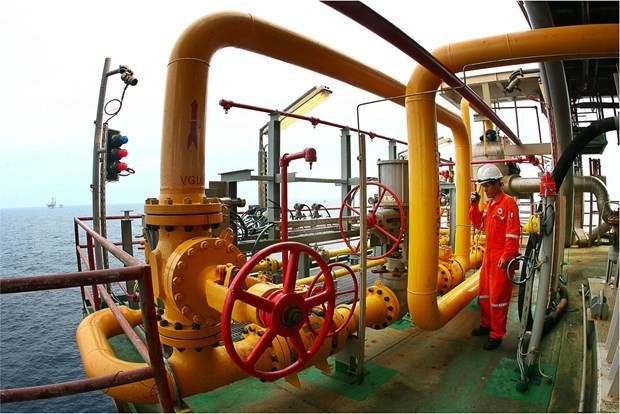Reduction of gas consumption causes negative impact on economy
 Workers at GPP gas works. (Photo: Vietnam+)
Workers at GPP gas works. (Photo: Vietnam+)Hanoi (VNA) - PVN said the reduced usage of gas for power generation will have a negative impact on the environment because natural gas is considered a clean energy with low greenhouse gas emissions.
According to the Vietnam Oil and Gas Group (PetroVietnam or PVN in short), in the first eight months of 2021, the demand for gas from customers, especially the power sector, is rather low. In the Southeast region, the use of gas for electricity production reached 87.5% of the whole year’s plan, and the figure for the Southwest region is only 72.7%.
A representative of PetroVietnam said power plants are now its key consumers, which account for 80% of the group’s total gas output. The decline of gas mobilization for power generation will reduce the capacity of factories, waste money already invested in the construction of gas-electricity clusters, and lead to a reduction of production in offshore oil and gas fields.
This will lower the State's revenues because oil and gas is the main source of incomes for the State budget at present. Budgets of many localities depending on gas exploitation activities are also affected, such as Ba Ria - Vung Tau province. It is expected that the province’s 2021 budget will decrease by 435 billion VND compared to 2020.
Gas mobilization for power generation is expected to continue to go down in 2022. The electricity sector is now facing the problem of redundant power when many factories across the nation reduce their capacity or stop working due to the impact of the COVID-19 epidemic, leading to the reduced electricity consumption.
In addition, the supply for the national power system has increased significantly after renewable energy projects were put into operation. This source of power is usually prioritized by the National Load Dispatch System (A0).
A representative of PetroVietnam said that the reduction in the use of gas for power generation will have a negative impact on the environment because natural gas is considered as clean energy with low greenhouse gas emissions.
This also affects investment poured into domestic oil and gas facilities as well as gas exploration and exploitation activities in general, especially in deep water and offshore areas. PetroVietnam believes that this is not in line with Resolution No. 55/NQ-TW issued by the Politburo on February 11, 2020 on the strategy for Vietnam's national energy development to 2030, with a vision to 2045.
The reduction of gas mobilization for power generation also affects LNG import projects according to the Prime Minister's Decision No. 2233/QD-TTg dated December 28, 2020 on the approving the Scheme on developing a competitive energy market through 2030, with a vision to 2045.
In the short term, this may affect the investment and construction of LNG import infrastructure. When the economy recovers, the increased energy demand will inevitably lead to a shortage of energy supply, while the ability to import LNG will be limited then because the development of LNG import infrastructure requires a long time duration, usually from 4 to 5 years.
The resolution set out the task of developing the gas industry to "prioritize investment in technical infrastructure for LNG import and consumption," and at the same time "focus on rapidly developing gas-fired power plants using LNG, gradually turning gas-fired power into an important source of electricity.
In order to help the gas industry to develop sustainably and continue to affirm its position as a clean and green energy source, contributing to ensuring national energy security in accordance with the guidelines of the Party and State, there should be a fairness in mobilizing power sources," the representative of PetroVietnam proposed./.













